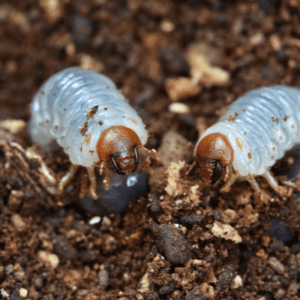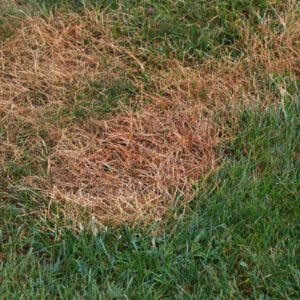I’m so happy we finally have grubs, said no one, ever. And no, we are not talking about the food delivery service. Anyone familiar with these lawn pests knows just how bothersome, challenging and destructive they can be. Lawn pests are a huge problem here in the Buckeye state, and the biggest culprit is lawn grubs. Not familiar with these tiny greyish-white creatures that feast on your lawn? Turf Pro Plus Lawn Care is here to tell you everything you need to know about this vicious varment, how it destroys your Cinncinnati lawn and what you can do to help prevent and control them. 
Grub Identity and Behavior
These sneaky devils are so tiny. You will probably never know you have them. They are the larvae of several different species of scarab beetles. Their parents look nothing like them and are harmless. The adults are between 1/3 and 1/2 inches in length with metallic green heads and copper-colored wing parts. Parts of their bodies also have tiny white hairs. They fly around your lawn looking for a safe place to lay their eggs. The eggs are laid right beneath the surface of your grass, so you never see them. Fifty to sixty days later, the eggs hatch into what looks like grey caterpillars. They are often curled up into a C-shaped caterpillar position. But during the time they are buried beneath your grass, they have ferocious appetites! Once they reach maturity, they too will emerge from your grass and appear like a garden beetle.
Damage Grubs Cause to Your Cincinnati Lawn
Too many young grubs feasting on your turf’s roots will cause your grass to wither and die. First, you will see signs and symptoms, but eventually, it will be too late, and you may end up needing a new lawn or complete renovation. Once the grubs become adults, they start eating the blades of your grass, which emits an odor. This odor allows other Japanese beetles to know there is a feast underway. More beetles will arrive, lay their eggs, and the cycle continues.
Symptoms of a Grub Problem
The symptoms of grubs can be seen in late summer through September, which in Cincinnati is right now. Therefore, if you notice brown spots, grass thinning, or other symptoms you can’t quite put your finger on, you may have a grub problem. How to know for sure? Look for the following signs and symptoms of a grub infestation:
- Thinning or yellowing of grass
- Uneven areas, making it harder to mow the lawn
- The grass feels spongy or too soft when you walk on it
- Sections of grass roll up easily if you step on it or kick it
- An increase in wildlife not seen before, especially moles, raccoons, skunks, and other medium-sized animals. These particular animals feast on grubs, and having an overabundance of grubs on your lawn will attract them. Certain species of birds, including crows, starlings, robins, and bluejays, feed on grubs.

How To Prevent a Grub Infestation
We can’t stop grubs from eating. Like anything living, they need food to survive. But we can ensure our lawn is healthy enough that if grubs do attack, it will be able to stand up to the stress. Grubs are better able to destroy a less healthy lawn already plagued by climate stressors, including drought, excessive heat, or too much rain. Invest in a lawn care program that offers the appropriate fertilization needed for your grass type so that it stays robust. Stick to a proper irrigation schedule, watering just enough but not too much because grubs are attracted to moisture and humidity.
Prevent Grubs From Destroying Your Lawn With Surface Insect Control Through Turf Pro Plus
Because lawn pests are already a huge problem in the Cincinnati area, take steps to prevent them now by investing in Turf Pro Plus’s Surface Insect and Grub Control. Our one-time application will prevent and control these hungry critters for the entire year. Maintain and protect your lawn with our Six-Step Lawn Care Program. Our slow-release fertilizers are designed to release nutrients over a long period of time keeping your grass healthy and strong while free of weeds and insects.
Contact us now to learn about both. You can reach us by phone at 513-545-6295 or visit our website and fill out our form online.
Did you find the above article helpful? Share it with your family and friends. Then share our other blog articles with them and check us out on Facebook, where you can get to know us more intimately.